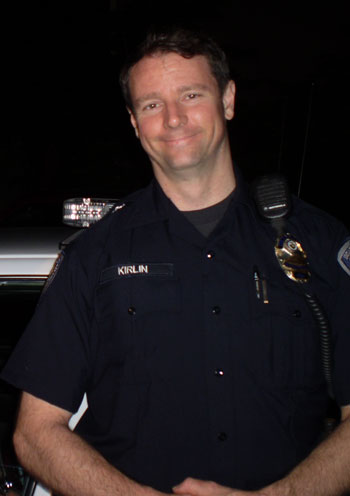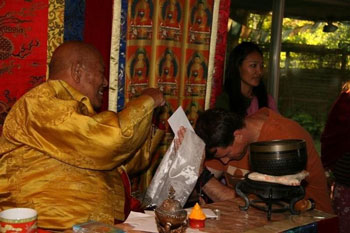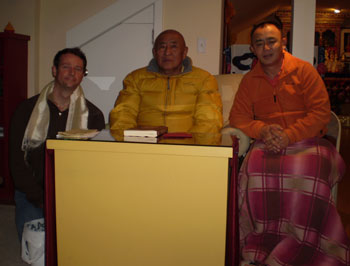
Author Mark Kirlin, in front of a squad car, taken during the summer of 2011.

Dharma and the Badge
A police officer brings Buddhist practice
into his work
A couple of months ago, a fellow sangha member asked me if I would be willing to write an article about how I’ve integrated Buddhist practice and beliefs with my career as a police officer. I have been very hesitant about doing so.
First of all, I feel under-qualified to write anything at all about Buddhist practice. I’m only a new practitioner, with a beginner’s understanding and very modest progress. On the other hand, I’ve been a police officer for a little over 18 years, and can write with some authority on police work.
Secondly, I am very aware of the stereotypes assigned to both police officers and to Buddhists. For that reason, I have kept the fact that I am a practicing Buddhist very quiet at work, and I have tried (and failed) to keep my career a secret from my sangha.
I’d like to share a relatively recent case I worked, and then relate that to how I have been able to interweave my limited understanding of Buddhism with my police career.
The night before Thanksgiving, I was called out to investigate a gang-related shooting. Two members of one gang (I’ll call them “T”) had tagged their gang’s name outside the home of members of a rival gang (I’ll call them “K”). Several of K’s members went to go beat up somebody, anybody, from T.
Members of K walked down that street and were met by two members from T, one of whom had grabbed a metal bar from his home. After exchanging a few colorful words about whose gang was better, a member of K’s gang pulled out a 9mm handgun and fired several rounds at both members of T. Everybody scattered, miraculously leaving only one 19-year-old kid with a bullet hole through his inner thigh.
This is a relatively good result.
After the event, as a matter of course the victim and his fellow gang members either refused to talk or lied about what happened, where it happened and who did it. Why? Because they had planned to take care of it with more violence.
After a few weeks of investigating, my partner and I interviewed five members of K’s gang several times (each time getting a bit more of the truth), and were able to get the shooter to confess. He was arrested for attempted murder and related crimes. He’s 17 years old.

Mark Kirlin makes an offering to Lama Tsering Wandg. Taken in September, 2010 at Dorje Ling in Portland.
Photo: Cynthia Wasser
The man who got shot (still a boy in my opinion, at age 19) was also arrested, for violating his parole and for unlawful use of a weapon (the metal bar). He will go to prison.
While gang members clearly must face the consequences of their negative behaviors, I do feel bad for them, and especially for their families. With very few exceptions the gangsters I’ve talked to, at least when they’re away from other gang members, are quite likable. They often have very nice, hard-working parents.
I would feel very sad if any one of them ended up getting killed. They all play the game, but none of them really believe they will get killed or go to prison. These are mostly just young people who need to belong, to get attention, to feel important and to be accepted. They get all that from gang life, but it comes with the dangers of serious injury, violent death and prison.
It’s relatively easy to have compassion for victims of crime, especially children, the elderly and the weak, but I’ve also always felt sympathetic (to varying degrees) toward people I arrest. However, since I’ve been practicing and learning Buddhism, I can see things a little more clearly, which makes it easier to have some understanding and compassion.
This does not mean I don’t believe in jail and prison. I most certainly do, as it often is the only thing that keeps some people from continuing to hurt others, and from a Buddhist point of view, it can help prevent the accrual of further negative karma. Some people who have hurt innocent people for many years get caught, do a little time, and then get out only to continue causing others to suffer.
It’s easy to see the five poisons behind all the negative things that criminals do, because the poisons are so exaggerated. In the case of gang members, the main poisons are anger and pride, fueled by a very strong sense of the difference between self and other. In domestic violence, there is often a strong cherishing of self, and a belief that the other person is there for the pleasure of that self. In many sex crimes, the overriding poisons seem to be desire and anger, but again, the root is the sacrifice of the happiness of the other for the happiness of the self.
In the case of burglars, thieves and fraudsters, there is almost always an addiction, usually methamphetamine or heroin, but sometimes prescription meds or gambling. In the case of all of the above the poison is almost always desire. Temporary pleasure from the drug of choice that is never satisfied takes over their being, often causing them to lose their jobs, friends and family.
So, to pay their rent, buy their drugs, or support their gambling habit, they burglarize, embezzle, and steal.

Mark Kirlin with his root teacher, HH Ngawang Tenzin Rinpoche from Bhutan. To Rinpoche’s left is Lama Karma Namgyel, Ngawang Tenzin's disciple. Photo taken in November, 2011, at the Drukpa Mila Center in Salem, Ore.
Police work can also highlight Buddhist teachings such as the four thoughts that turn the mind. Seeing people living in miserable situations makes me appreciate the precious human life I have.
Impermanence is underscored by every death I’ve seen, whether premature, accidental, violent or natural. Seeing how various people’s actions have caused them great suffering aids my understanding of the laws of cause and effect. And finally, considering that my entire job is centered around suffering of some sort, seeing samsara as an ocean of suffering is easy.
In terms of the six paramitas (six perfections), police work offers many opportunities to practice patience (I’ve endured being hit, kicked, spit on, bit, threatened and insulted numerous times), many opportunities to practice compassion, and even opportunities to practice generosity in the form of offering protection from fear. I’ve always tried to treat people with compassion and respect, but now I can do so more naturally and insightfully than before. This is partly due to simple maturity and experience, but partly due to Buddhist teachings I’ve taken to heart.
As for moral discipline, police officers are required to have this to a certain extent, but, if measured in relation to the 10 virtues, some of these are violated by necessity. For example, I have found it necessary to lie in order to get cooperation, or to obtain a confession. I wish it were not so, but I would be far less effective if I was always honest. To use the example of the shooting investigation, I lied to one of the suspects, telling him that we were currently talking to his friend. It wasn’t true, but his friend was in custody, and I was going to be talking to him eventually. As a consequence, he began telling at least some of the truth.
In police work we are required by the nature of our job to be able to take a life. Since becoming Buddhist, I’ve given this a lot of thought and have looked deeper into this unlikely, but potential, aspect of my job. I was surprised to find that even the Dalai Lama has said that sometimes violence is necessary for defense (1). And in chapter eight of the Vinaya, in the Pali Canon, (2) the Buddha allows for a monk to strike another monk in self-defense, but without anger. Police work demands violence on a regular basis to arrest resisting or fleeing suspects. But this violence is necessary, measured and should be without anger. Although most police officers in the West are not Buddhists, most are also capable of controlling their emotions in volatile situations. Those who can’t usually don’t stay in police work.
While police officers are not taught to shoot to kill, we are taught to stop a threat, which sometimes results in death. It would seem like this heavy aspect of the job would be the most in conflict with Buddhist practice. However, if confronted by a person who is intent on killing myself or another, choosing to not act, and allowing that person to kill me or to kill another, has not prevented killing. In addition, the person who formed the intention to kill, and completed the act of killing (and possibly rejoiced in the act), has now induced great karmic debt. Not only that, but when a precious human life is lost, that person who has died no longer has the opportunity to practice dharma, thus losing an opportunity to benefit to all sentient beings.
In my present view, if a person has the ability to prevent the suffering of another, but fails to act out of fear of creating bad karma for themselves, then that person has acted very selfishly.
Anybody could be faced with a life-and-death encounter, and we all need to think about how we would or could react, and how we might cope with the aftermath.
As for joyful effort, there is often the opportunity to do something good for others. In this respect, I feel very fortunate to have a career through which I can directly help people. I can help solve disputes, recover stolen property, console, counsel, or just show kindness and compassion.
These opportunities are mostly available for everybody, but they are abundant in my career. There is much that is not pleasant, but the occasional bright spot makes all of it worth it.
The fifth paramita, meditation, has benefitted me greatly in police work.
For a police officer, the experience of work is primarily negative. Like any job, there is the normal stress of dealing with difficult personalities, paperwork, deadlines and lack of control over the working environment. Unlike most jobs, however, every single day is filled primarily with negativity. Every case we work has a victim or victims who have been hurt in some way, and who are sad and or angry. And then there’s a suspect or suspects, who will likely lose their freedom and wealth as a consequence of their actions, which makes them sad and angry. It is easy to become depressed and cynical if you don’t have something positive to anchor you.
Buddhist meditation practice has greatly helped me cope with the stress of police work, and has made me more patient and compassionate. I’ve noticed that things that bothered me in the past still bother me, but to a lesser extent. I still get angry, but it doesn’t last as long, and it’s not as strong. I can reflect on teachings such as Shantideva’s Way of the Bodhisattva, or take a moment and think about the illusory nature of samsara, and how unimportant worldly life is in comparison to spiritual development.
I am really not qualified to talk about any of the paramitas, but I won’t even attempt to approach the six paramita, wisdom. At least I’m wise enough to know I’m not wise enough.
I’m also wise enough to know that if read this essay five years from now, I will likely cringe.
These are my current views, which are coming from a still-ignorant being who is trying to slowly chip away at that veil of ignorance. If I have the same understanding five years from now, it means I haven’t been practicing. I do, however, believe that I’ll still feel fortunate to have a career in law enforcement. With the right attitude, there is much good that can be done.
References
1. Bernton, Hal (May 15, 2001) Seattle Times “Dalai Lama Urges Students to Shape the World”
2. Thannisaro Bikkhu (2007) Buddhist Monastic Code I, The Pattimokkha Training Rules Translated and Explained, chapter 8.8
About the author:
Mark Kirlin lives in the Portland area and has served as a police officer for 18 years. His Buddhist practice is primarily in the Tibetan Nyingma and Kagyu traditions. He is married, with two children.